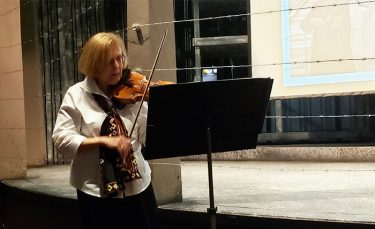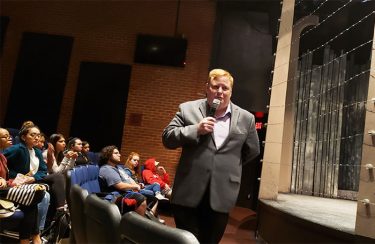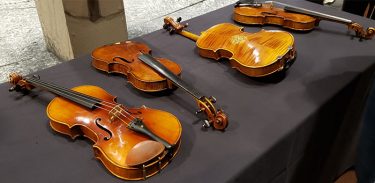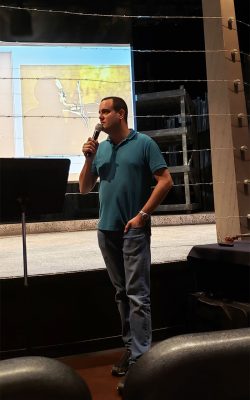
Story and photos by Lana Sweeten-Shults
GCU News Bureau
Music does not always soothe the savage beast; in the Nazi concentration camps, it often became the beast.

“The Nazis used and abused music in many different ways,” said Avshi Weinstein, a third-generation violin maker and restorer who spoke about the Violins of Hope project on Friday at Grand Canyon University’s Ethington Theatre. He brought four of those violins, all instruments from the Holocaust, which were played at the talk by Cynthia DuBrow and Megan Asher.
The lecture, including a brief overview of the Holocaust by College of Humanities and Social Sciences Dean Dr. Sherman Elliott, was the first educational talk in Violins of Hope Phoenix, a two-month-long series of plays, art exhibits, concerts and more that are bringing to light stories of the Holocaust, including GCU Theatre’s recent production of “Who Will Carry the Word?”
Every concentration camp had at least one orchestra, Weinstein said.
When prisoners arrived, sometimes after weeks packed in cattle cars, bodies upon bodies with no room to move, they stepped off the train to the strains of music whose beauty would mask the horrors to come.
At Auschwitz, Jewish prisoners would depart for work details in the morning to the sound of music. When they returned, too tired to walk, music from the orchestra greeted them again.

Rain. Snow. It didn’t matter. The orchestra had to play.
“The dead would be piled just in front of the orchestra,” Weinstein said of those who did not survive the day of work. “They had to play music seeing all those dead people. … Many of those people who played with the orchestra never touched an instrument again.”
Weinstein recalled a concentration camp survivor he met after a lecture he gave in Florida two years ago.
“He called me and said, ‘For me, today, to sit down here and hear this concert, it was a torture.’ He told me in the camp where he was, if the Nazis wanted to hear this or that piece of music, all the camp had to stand for hours in the rain or snow and listen to music. All they wanted was to try and rest ... So for him, concerts and music were a torture.”
Weinstein’s paternal grandfather, Moshe, who immigrated to Israel in 1938, started to buy Holocaust violins after the war, when other Jewish immigrants, with no homes to return to, started also to make their way to Israel. No one wanted to touch anything German in Israel, Avshi said.
“No German cars, no German goods, German electronics. They wouldn’t say the word German on the radio,” Weinstein said. “Those with German-made instruments, many of them came to my grandfather, and they told him something very simple: ‘Either you are going to buy this instrument from me, or I’m going to destroy it.'”
To destroy an instrument, German or not, was sacrilege to Weinstein's grandfather, so he bought them.
It wasn't until the 1990s, when a German apprentice came to work for Weinstein’s father, Amnon, that the collection became something more. The apprentice spent two years trying to persuade Amnon to lecture the German Association of Luthiers in Dresden about those German violins and how they ended up in his shop.

After that lecture, Amnon spoke on a radio program and asked people to bring him their Holocaust violins.
“Today we have 73 in the collection, and we are still getting more and more instruments,” Weinstein said.
It has been Amnon’s calling, and now his son's, to restore not just the beauty of the instruments but give the voices back to the musicians who once played them.
One of the instruments Weinstein brought to his GCU lecture was the Auschwitz Violin, given to the Weinsteins by Freddy Davidowitz. Freddy’s father, Abraham, said he met a survivor of Auschwitz after the war who told Abraham, “Listen, I have nothing in this world. The only thing I have is this instrument. If you would buy it from me, maybe I have some money, maybe I can start my life.”
Abraham bought it for $50.
Weinstein also spoke of the Zimmerman-Krongold violin, which he brought to the lecture.
Shimon Krongold was a wealthy Jewish industrialist in Warsaw and an amateur violinist who would allow young Jewish violinists to practice in his home, while Yaakov Zimmerman was one of three or four Jewish violin makers before the war.
Zimmerman made the violin in the collection special order for Krongold. It is decorated with a Star of David on the back.
An interesting thing to note about Krongold, Weinstein said, is that one of the young violinists who would practice in his home was Michel Schwalbe, who survived the Holocaust and became the concertmaster of the Berlin Philharmonic.
While the Holocaust would turn music into torture for some of its survivors, it also would be a savior to some, such as Henry Meyer.
Meyer was 20 years old when, sick and weak, he ended up in the Auschwitz infirmary. Meyer started talking to the doctor and asked what he did before the war. When the physician mentioned that he spent some time at Breslau, Meyer said, “I played a concert at Breslau.”

The doctor immediately recognized the prisoner as the child prodigy he saw performing at that concert and took action, switching Meyer’s number card with that of a nearby corpse so the Nazis wouldn’t take him away.
“This is how Henry survived,” Weinstein said.
Meyer, who also would survive a death march of prisoners to Berlin, would go on to work as a professor of music at the University of Cincinnati.
Weinstein told another story about Alma Rosé, a gifted Austrian violinist from a well-known family of musicians (her uncle was famed composer Gustav Mahler). Rosé’s family had moved to London, but she decided to return to Europe to restart her career.
“She believed she would be safe because she was Christian,” Weinstein said.
But she wasn’t.
After her capture by the Nazis, she was sent to Birkenau and became the head of the orchestra.
“Alma believed if the orchestra would play well and work hard, the Nazis, who needed musicians, would keep them safe. She made the women work very hard. They had to learn, all the time, new repertoire. … All of the musicians that played in Alma’s orchestra, all of them stayed alive,” Weinstein said. Sadly, Rosé herself died about two months before the liberation.
One of her players, Anita Lasker Wallfisch – whose son, Rafael, “is one of the best cello players in the world" – continued to perform after the war.
“Today still, at 94 years old, she goes around giving lectures all around Europe, and she smokes … nonstop from morning to night,” Weinstein said with a smile.
Music was a comfort, too, to the family of GCU Associate Professor Dr. Isac Artzi, whose grandparents and parents were deported to Transnistria (now eastern Moldova) to a concentration camp in 1941.
“My dad, who was 9 at the time, started to learn to play violin with the older men in the camp,” Artzi said. He would go on to play in a local orchestra in Romania after the war, and Artzi himself would also learn to play violin. The lead of GCU's computer science program studied at conservatories in Romania and Israel.
Artzi said, like many survivors, his grandfather forbade any talk of the war, but his grandmother shared with him so many stories from the war that he keeps close to his heart.
Artzi had something in common with Weinstein beyond the violin. Both their grandfathers served in the Soviet army in World War II.
Weinstein shared one more story from the war, this one about his maternal grandfather, Asael Bielski, who was one of the Jewish resistance fighters portrayed in the film “Defiance.” The Bielski brothers lived in the forest of eastern Poland (now Belarus) for three years and established a hidden community there, saving 1,230 Jews, Weinstein said.
Junior communications major Maria Jackson attended the Violins of Hope presentation and was planning to see GCU’s Holocaust play, “Who Will Carry the Word?” that night.
“I love learning about World War II and the Holocaust, and I also love violin and strings and thought it would be a really cool opportunity to hear these stories,” she said.
Sarah Dice, another junior communications major, said her roommate is in the play, so she especially wanted to hear Weinstein’s talk.
“History has always been really important to me, " Dice said. " ... Obviously we don’t want to re-live (the Holocaust) history, so I think it’s important to talk about these stories and understand what they are and what they mean to us, and that helps us learn from them to understand the human story and then move forward. I really love having something like the violins to be able to hear the story in a very literal way.”
For more about the many Violins of Hope Phoenix events, click here.
GCU senior writer Lana Sweeten-Shults can be reached at [email protected] or at 602-639-7901.
***
Related content:
GCU Today: "GCU brings dark era of Holocaust to light"
GCU Today: "Violins of Hope bring story of Holocaust to campus"



































































